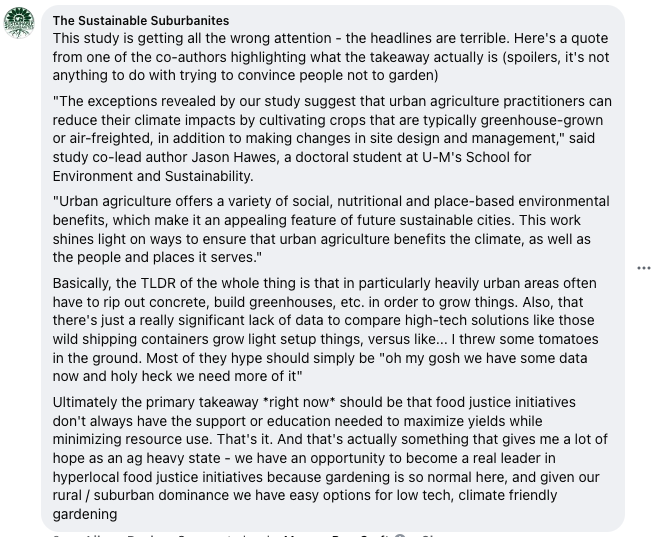I’ve spent a lot of time engaging online about this friggin fraggin University of Michigan Study that’s fueling conspiracy nonsense… SO LETS UNPACK BEFORE I EXPLODE, SHALL WE!?

**strangled millennial frustration noises**
Engaging Online
Here’s kind of the TLDR I’ve been sharing in comment sections when folks inevitably share the headlines that are proclaiming “Home grown food bad for the planet” and “they’re gonna ban gardening” other such nonsense.

As you can gather from the quote I share in that comment, when you actually read the study or any conversations with…. you know.. the really smart sustainability guy who co-authored the study, there are a few things going on here that aren’t being addressed by the headlines.
- There is not a heck of a lot of data to begin with. That’s a huge part of the problem is that its tricky to quantify what exactly “urban agriculture” (UA) is and how we measure its climate friendliness. This study set out to build kind of a baseline for that.
- The solutions outlined in the paper heavily emphasize modifications to UA that are based in community education about general waste reduction efforts like recycling, composting, and materials reuse.
- NOWHERE in the paper is there ANY indication that the authors want people to stop gardening or partaking in food justice initiatives in any place. That’s just nonsense. The call is for *more data* and *better resource management* in existing spaces
Upcycling isn’t just for hippies
When I read through this study, I actually get SUPER happy because it confirms a lot of what sustainability minded, socially conscious people know from our lived experiences.
Hyperlocal climate action works, and small changes do add up to big change.
For example, this quote indicates that being a locally sourced upcycle nerd isn’t meaningless. Folks really like to pawn that off as a minor change that isn’t practical for larger groups to do, but holy heck it makes a big difference:
“If our UA sites sourced all their materials from urban waste, all three forms of UA would be carbon-competitive with conventional agriculture (that is, there is no statistically significant difference). However, much of the reuse of building materials at our sites is opportunistic, and overall recycling rates of construction and demolition waste are abysmal (excepting crushed aggregates for road fill)34.”
Page 165
They also highlight within the study the social benefits of UA! Which I think is significant because that’s what draws so many people to gardening in the first place.
The End
I could write about this forever and ever but I set a timer for ten minutes because I have to go do other things now. BUT this has been my quicky “don’t read too much into these headlines” explanation and I hope it helps! Read the article directly (its dense but not unmanageable) and remember that online rantings don’t always reflect the real world.
Go touch grass and have a nice day 🙂
